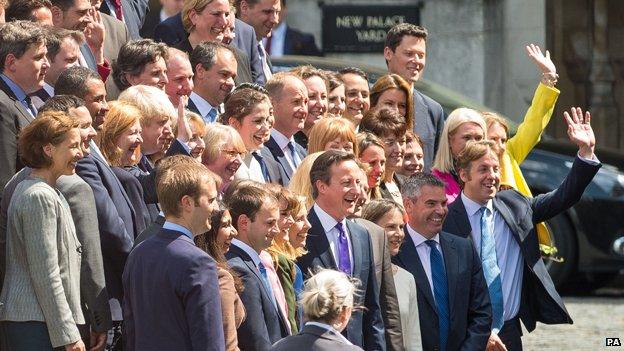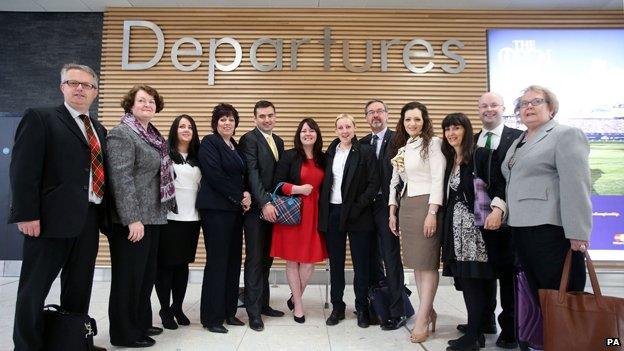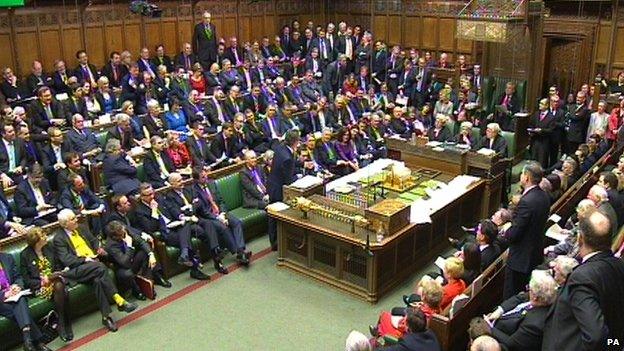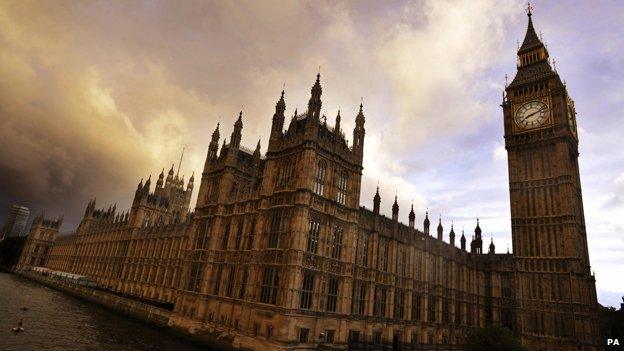Who would be a Member of Parliament?
- Published
- comments

New Conservative MPs pose with David Cameron
More than 180 new MPs arrive at the Houses of Parliament for the first time this week. What motivates them? Power? Glory? Pay and perks?
Or might it be the principle of public service?
When it was confirmed to David Cameron that he had won an overall majority at the election he made two speeches - one relatively private, the second very public.
In the first, at a bouncing Conservative party headquarters he told his jubilant supporters: "The real reason to be excited is we are going to get the opportunity to serve our country again."
The second was in Downing Street. "Elections can be bruising clashes of ideas and arguments and a lot of people who believe profoundly in public service have seen that service cut short," he said.
"Ed Miliband rang me this morning to wish me luck with the new government. It was a typically generous gesture from someone who is clearly in public service for all the right reasons."
What are we to make of all this "public service" stuff? Perhaps it was just slightly misty-eyed magnanimity from a man suffering sleep deprivation. I don't think so.
The prime minister's focus on public service to his party and to the country was, I think, a rare glimpse of a motivation that too often gets ignored or dismissed both inside the Westminster bubble and in the country beyond.
As the Times journalist Louis Heren said when asked what went through his mind when a politician shared a confidence, many members of the public hear an MP and think: "Why is this lying bastard lying to me?"
Selflessness, integrity, objectivity, leadership, accountability, openness and honesty are not regarded as defining features of our elected representatives. Quite the opposite.

Newly elected SNP MPs prepare to fly from Glasgow to London this morning
And yet I list those seven qualities because they are the Nolan principles which underpin the concept of Standards in Public Life, external, drafted after the cash for questions scandals of the 80s and early 90s, a response to a crisis of trust.
For centuries the concept of public service was simply understood. There was no need for it to be spelled out. But the end of deference and a new age of transparency and accountability have necessitated the introduction of codes of behaviour, independent oversight and official guidance on parliamentary duties.
The last few decades have revealed numerous shameful episodes involving MPs, the expenses scandal among the very worst.
But the problem, it seems to me, is not that greater scrutiny has revealed the self-serving greed of those we elect, but that the brutal nature of our politics and public sphere obscures their decency and altruism.
Most politicians in my experience are driven by a sense of public service. Some of them advance ideas for improving common well-being that are far removed from my own. But that doesn't make them self-serving.
A lot of this is presentational. What does politics look like? For most people it is Prime Minister's Questions, angry exchanges drowned out by baying benches, a spectacle that seems at odds with high-minded principles of public service.

PMQs: A spectacle at odds with principles of public service?
We have just witnessed an election where the main parties appeared reluctant to engage with the public they say they wish to serve, and reluctant too to be open and honest about their true intentions in government.
There seemed to be a lack of authenticity - campaigns masterminded by spin doctors and PR advisors, where every move and comment seemed contrived. It might be the best way to garner votes, but our politics appears cynical and self-serving, reinforcing the sense that our politicians are too.
We want to trust them, to believe in them. But they let us down, break their promises as they feather their nests. Or at least that is the story that pervades.
The complexities and compromises of real-world politics are interpreted as cowardice and betrayal. Principles appear abandoned with every concession that is made.
The media reinforce this public distrust - partly because they may wish to echo the prejudices of their consumers or owners, but also because (quite rightly) journalists regard holding the executive to account as a key part of their job.
But unless they start from the viewpoint that honourable members are almost certainly dishonourable weasels, they risk being seen as patsies.

We have created a one-way ratchet of cynicism. Greater transparency reveals the frailties of largely decent men and women, fuelling demands for yet greater transparency.
Government cannot be conducted in a goldfish bowl, but notions of confidentiality or privacy are branded as cover-up and conspiracy. Each "revelation", magnified by the media and framed in a narrative of contempt, undermines trust in politics and weakens civil society.
So, to the new Members of Parliament attempting to find their feet and their office in the Palace of Westminster I say: "Good luck". You are going to need it.